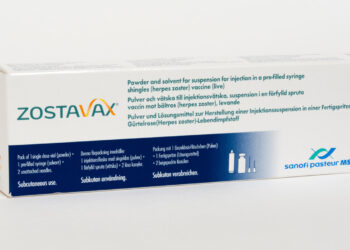SAN FRANCISCO — Adding camrelizumab and rivoceranib to transarterial chemoembolization (TACE) significantly prolonged progression-free survival (PFS) in patients with unresectable hepatocellular carcinoma (HCC), according to results from the CARES-005 study.
At a median follow-up of 13.6 months, the median PFS was 10.8 months with TACE plus camrelizumab and rivoceranib (TACE-CR) versus 3.2 months with TACE alone (HR 0.34, 95% CI 0.24-0.50, PResponse Evaluation Criteria in Cancer of the Liver) in the intention-to-treat (ITT) population.
The 6-month PFS was 70.8% with TACE-CR and 31.5% with TACE alone. And median PFS per modified RECIST criteria (a secondary study endpoint) was a median 8.8 months and 3.1 months, respectively (HR 0.43, 95% CI 0.30-0.62), with 6-month PFS rates of 63.9% and 29.6%, respectively.
“The CARES-oo5 study showed a clinically meaningful and statistically significant improvement in the primary endpoint of PFS for unresectable HCC who received TACE plus immunotherapy-based systemic treatment, compared to TACE alone,” Teng said at the American Society of Clinical Oncology (ASCO) Gastrointestinal (GI) Cancers Symposium.
Objective response (ORR) and disease control (DCR) rates were 65.0% and 87.0% in the TACE-CR group and 30.0% and 63.0% in the TACE group, respectively, per RECICL, with a duration of response of 11.4 and 6.9 months in the two groups. Per RECIST criteria, the ORR and DCR rates were 61% and 85% in the TACE-CR group, and 29% and 58% in the TACE group, with a duration of response of 7.6 and 4.7 months.
While overall survival (OS) data were immature, there was a trend towards improved OS in the ITT population at a median 24.0 months with TACE-CR versus 21.5 months with TACE alone (HR 0.87, 95% CI 0.57-1.32), with 12-month OS rates of 74.5% and 66.2%, respectively.
Teng observed that while TACE has been established as a standard treatment for intermediate HCC, long-term survival has been limited, resulting in an unmet need for improved survival benefits.
“Combining TACE with immunotherapy-based treatment can potentially enhance antitumor efficacy by activating the immune system, and therefore converting cold tumor to hot tumor responding to immunotherapy,” Teng explained.
Such regimens have been successfully tested in other trials, such as EMERALD-1 and LEAP-012.
At the 2024 symposium, Riccardo Lencioni, MD, of the University of Pisa in Italy presented results from EMERALD-1, showing that patients who received durvalumab (Imfinzi) plus bevacizumab (Avastin) in addition to TACE had a median PFS 15.0 months versus 8.2 months for TACE.
“The EMERALD-1 trial met the primary endpoint and is the first, global phase III study to demonstrate a statistically significant and clinically meaningful improvement in PFS with an immunotherapy and TACE-based regimen in unresectable HCC eligible for embolization,” said Lencioni at the time.
In LEAP-012, median PFS increased from 10 months with TACE to 14.6 months with the addition of lenvatinib (Lenvima) and pembrolizumab (Keytruda) in patients with intermediate-stage liver cancer.
While CARES-005 had lower survival rates in both the experimental and control groups than EMERALD-1 and LEAP-012, Teng noted that CARES-005 had a patient population with later tumor stage and a higher tumor burden than the other two studies. Specifically, the majority of patients in the current trial had a Barcelona Clinical Liver Cancer stage B (intermediate) or stage C (advanced), while 89-90% had a tumor burden at baseline of beyond >7 criteria.
In 2024, the FDA accepted a resubmission of a new drug application for the combination of camrelizumab, an anti-PD-1 inhibitor, and rivoceranib, an anti-angiogenic tyrosine kinase inhibitor, as standard first-line treatment for HCC that is unsuitable for resection, based on the CARES-310 study. Under the name apatinib (Aitan), rivoceranib was approved in gastric cancer in China in 2014; it was approved in combination with camrelizumab as first-line treatment for unresectable HCC in 2023.
CARES-005 was conducted at 23 sites in China and included 200 patients with unresectable HCC who were eligible for embolization and randomized to receive either TACE-CR or TACE alone. The median age was 58.5 in the TACE-CR group and 57 in the TACE group, while both groups were 87% male. The study has an estimated completion date of January 2026.
Regarding safety, Teng said the safety profile for TACE-CR was “manageable and consistent with the known adverse event profiles of TACE, camrelizumab, and rivoceranib in unresectable HCC.”
Grade ≥3 treatment-related adverse events (TRAEs) occurred in 76.6% of patients with TACE-CR and 24.3% of patients with TACE. The most common grade ≥3 TRAEs in the TACE-CR group were increased aspartate aminotransferase (AST, 30.9%), increased alanine aminotransferase (ALT, 24.5%), hypertension (13.8%), and decreased platelet count (11.7%) group. The most common in the TACE-alone groups were increased ALT (13.6%) and increased AST (12.6%).
Disclosures
CARES-005 is supported by Jiangsu Hengrui Phamaceuticals. Some co-authors are company employees.
Teng and co-authors disclosed no relationships with industry.
Primary Source
ASCO Gastrointestinal Cancers Symposium
Source Reference: Teng G-J, et al “Transarterial chemoembolization (TACE) combined with camrelizumab and rivoceranib versus TACE alone in the treatment of unresectable hepatocellular carcinoma: A multicenter, open-label, randomized phase II study (CARES-005)” ASCO GICS 2025.
Source link : https://www.medpagetoday.com/meetingcoverage/mgics/113942
Author :
Publish date : 2025-01-26 13:14:51
Copyright for syndicated content belongs to the linked Source.














